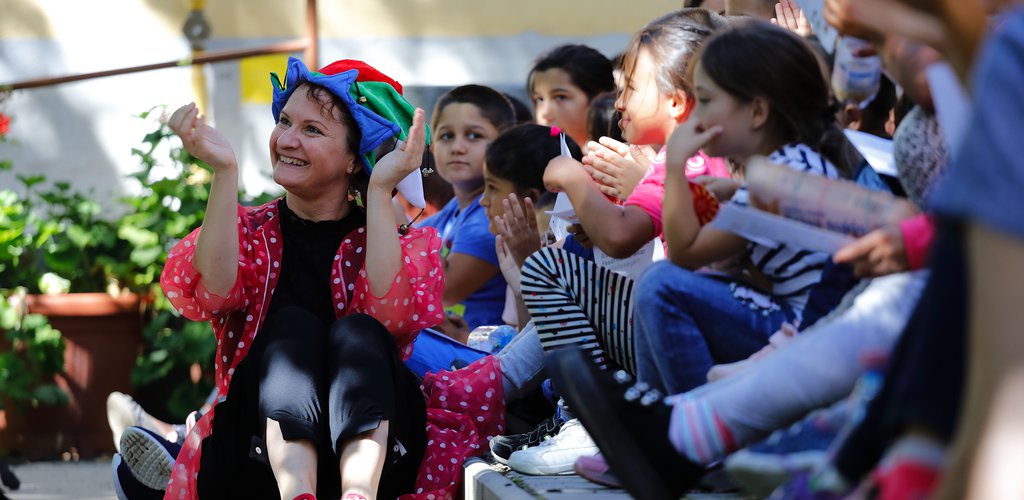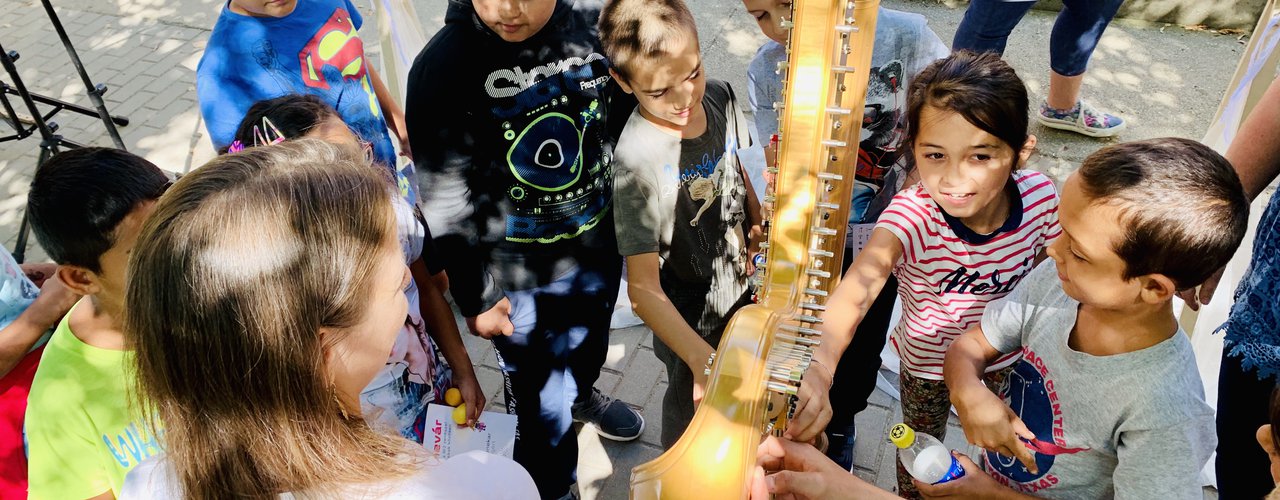The Budapest Festival Orchestra (BFO) is one of the world’s most sought-after ensembles. Its members know their rehearsal and concert schedule one year ahead for all performances whether in Tokyo, New York or in Tarnabod, Cserdi, the children’s home in Bicske or the Vadaskert children’s mental hospital. The journalist of Dívány.hu interviewed Erika Illési, the orchestra’s violinist and leader of the Music Castle program.
As part of the BFO’s Community Week the orchestra normally journeys to disadvantaged regions of the country to give free concerts. The initiative was launched five years ago, and involves giving chamber music concerts for two weeks each year across the country in churches, synagogues, and old people’s and children’s homes.
The Budapest Festival Orchestra’s violinist Erika Illési also studies music therapy and she is the leader of the Music Castle children’s program. At these events, classical pieces are always structured along a story she tells on the stage. “This is the first encounter the majority of Music Castle’s young audiences has with classical music, making it impractical to give these kids a conventional concert, for which they need to learn the language of music first. Someone who is completely unfamiliar with this genre would probably not be able to appreciate it and may even be bored by it. It would be like feeding someone who has only had fries and burgers all his life with caviar and escargot – utterly revolted, he would most likely dump them into a garbage bin. This way, they can embrace music integrated into a story, and immediately discover everything it can be used to express. In my experience this always has a profound effect on kids. They listen to even the most difficult and slowest pieces in hushed silence.”
That said, each kid has a different, but overwhelmingly positive response depending on their personality, family background, health and mental state and circumstances. There are always some loud and rowdy kids among the audience, with no idea what they are there for and what to expect, which is why the concert starts with Erika and the children having a conversation and making simple instruments – rattles from plastic bottles and stringed instruments from egg cartons and rubber bands – to make music together.
“Most recently we gave a concert at the hospital of Vadaskert Foundation, which was attended by children from the local school as well as children, tweens and teenagers from the mental hospital. Each age group has a different way of listening to a tale, which is a basic premise in fairy tale therapy. For them, I came up with a variation on Sleeping Beauty, in which Sleeping Beauty falls asleep and everyone is trying to wake her up. This version was specifically created for teenage audiences, and somehow everyone grasped that this was intended as an allegory for the state of mind where teenagers close themselves off, don their “teenager’s mask” and become inaccessible to grownups. The central question was how to wake her – miracle workers came and went, cures were proposed, and the plot, whose every detail was carefully crafted beforehand, seemed to resonate with the children.”
Triggering something important
Though these concerts are one-off events, they can act as a trigger for something important. Many times, children start learning music as a result of this experience, and then the orchestra or the foundation inviting it can put them in touch with the local music school or the local teachers. Learning music can be a way to relieve stress just like sports, a complex mental and physical support for the psychological development of teenagers.
“We visited the You Belong! Foundation in Ózd. They seemed to be a difficult audience – the space was cramped and children were loud and boisterous. Before plunging into our performance, just as our harpist was tuning her instrument, one of the loudest kids from the front row piped up saying “That still sounds a little off-key...” Needless to say, we were completely awe-struck. As we found out later, the boy had perfect pitch, and eventually it was arranged through the foundation to provide him with music lessons and the right training for his skills.”
“In these cases, learning music has a huge benefit of helping channel not only tempers but also emotional tensions, which might be difficult for some to verbalize, but easier to express this way. Music is an outlet, and music training is a journey to personal development. And it doesn’t necessarily have to be classical music. Good music such as jazz, good rock, techno, rap, in other words, music with a strong rhythm has the power to give you a sense of connectedness with the Earth and make you feel like you’re not existing in a vacuum, culminating in a sort of ecstasy. It makes a way better drug than chemicals. At these concerts we witness the ecstatic effect using two pot lids to beat out the rhythm can have on children.”
Music therapy at all ages
The other end of the spectrum are the elderly, who are touched by music in a completely different way. Performances given at old people’s homes are closer to conventional concerts, though they also include introductions between the pieces designed to involve and engage the audience. The inhabitants do a little spruce-up for the concert by putting on their best clothes and doing their hair, and, not having experienced live classical music for years, are in general looking forward to it very much. These chamber music concerts are organized by one of the orchestra’s cellists Lajos Dvorák, who told us the story of an elderly man with dementia who, thanks to the concert, started talking with others again even though he hadn’t communicated with anyone for a long time. No wonder music therapy is becoming increasingly widespread within art therapy and is used in special education as well as in psychiatry with great results.
Music Castle
In each season, the Budapest Festival Orchestra embarks upon a journey to take classical music to those who, be it for medical, social, physical or financial reasons, would not normally …


